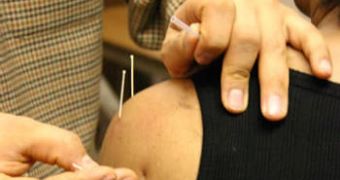According to a joint scientific study by groups from Daejon and Busan, in South Korea, and Exeter, in the United Kingdom, acupuncture does not seem to work in alleviating “hot flushes,” also known as “night sweats,” a series of symptoms that occurs in women when they reach menopause, on account of the changes they suffer in their hormone production. The teams, who have published their finds in the latest issue of the peer-reviewed journal Climacteric, say that they could not find any empirical evidence that the 5,000-year-old Chinese practice is effective in treating the hormonal imbalance.
The study has been prompted by the fact that numerous women who are afraid of or do not trust the hormone-replacement therapy – the “official” treatment for hot flushes – seek out alternative solutions to their problem, so as to avoid having to endure these flushes in the years before and after menopause.
In their quest for these new ways of treatment, a good number of them turn to acupuncture, which is advertised as having numerous applications in a number of diseases. And, indeed, it is able to cure or at least stop the progress of myopia, hepatitis, or other affections.
It would seem, however, that in the case of hot flushes, the Chinese practice is powerless. The teams in the two countries have analyzed some 6 very relevant randomized controlled trials (RCT), in which women have been treated with “real” acupuncture or with a “sham” one for a number of days. Only one of the papers has reported improvements, as assessed after a four-week period, whereas the others have shown no such progress. In all fairness, none of the other five studies has reported a multiplication in the number of the gravity of the flushes either.
“Although the availability of good RCT is too small to draw any firm conclusion, in general the evidence from sham-controlled RCTs for the effects of acupuncture for treating menopausal hot flush is not convincing. We would always recommend that women wanting relief from menopausal symptoms consult their clinician before undertaking any course of treatment,” the lead researcher of the new investigation, Korea Institute of Oriental Medicine expert Dr. Myeong Soo Lee, said.
“There's no doubt that many women need relief from the symptoms associated with the menopause. They need to make sure that the treatment they choose works, and is right for them. I would always recommend that a woman consult her clinician before starting any treatment,” the President of the International Menopause Society, Dr. David Sturdee, emphasized in a comment.

 14 DAY TRIAL //
14 DAY TRIAL //